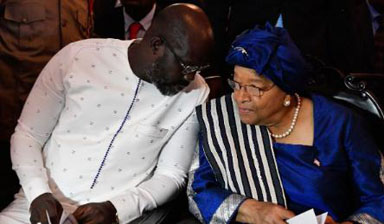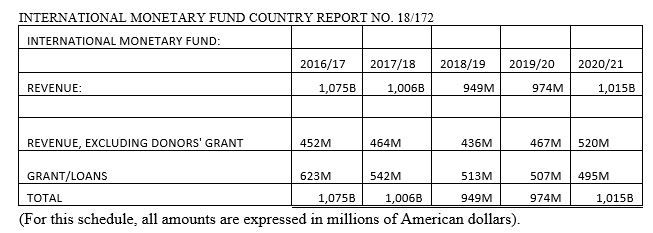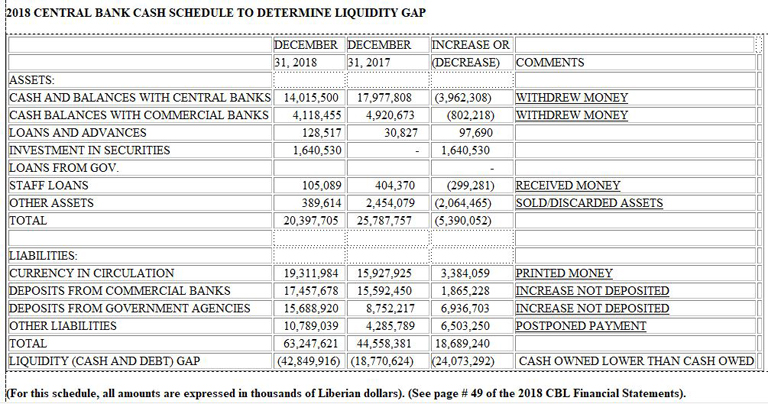Central Bank In Red ($265m). Presidents: Weah ($137m) & Sirleaf ($128m)
By J. Yanqui Zaza
The Perspective
Atlanta, Georgia
July 6, 2019
 |
|---|
| Passing on the corruption legacy |
President George Weah, through the Minister of Finance, Planning and Economic Affairs, has submitted the 2019/2020 national budget to the Liberian Legislature and his government had also published the 2018/2019 Citizens Guide Budget, which includes $500M of Donors’ grants/loans.
However, none of these two documents and/or the International Monetary Fund (IMF) Report on Liberia, Country No. 18/172, provides information on how Liberia’s positive US $6M in 2006, declined to $265M negative cash position at 2018. Liberia’s cash position is negative because of withdrawals. For example, even after printing new banknotes, beginning in 2016, former President Ellen Johnson Sirleaf Administration withdrew US $75M from accounts held in banks located outside of Liberia, as per page # 11of the 2017 CBL Financial Statements. ($211M in 2016 minus $136M in 2017).
Neither, did her Administration disclose the purpose for which CBL withdrew $93M ($165M 2016 minus $72M in 2017) of government’s deposits held at CBL. (See page # 11 of the 2017 CBL Financial Reports). Were the withdrawals necessary for former President Sirleaf and President Weah to cover up budgetary shortfalls, for instance, the 2018 $222M? If the Administrations borrowed from CBL, were they not in violation Section 2, Part III 41(1-5) of the 1999 Bank Act? The Act limits the amount to be borrowed and limits the period within which government (i.e., parent) should repay the loans. More so, why did the government not borrow from the market by selling treasury bills? Better yet, why the government did not use the borrowing arrangements provided by the IMF?
Further, why is Liberia having a cashflow problem since Liberia’s combined revenue is about $1B since 2006 (i.e., $500M grants/loans from our international partners plus our $500M of domestic revenue)? The Citizens Budget of 2018/2019 reported that Liberia receives $500M from its development partners. The “Off-budget money” is usually given to non-governmental organizations (NGOs) working in Liberia or to government agencies. Also, the IMF Country Report No. 18/172 provided more information on Liberia’s combined revenue.
 |
|---|
Page # 88 of the IMF Country Report No. 18/172 stated that nongovernmental agencies used the $500M grants/loans from the World Bank, etc. to work on twenty-one projects within Liberia’s fifteen counties, according to page # 10 of Liberia Citizens Budget. Some of the twenty-one projects, include Support Project West Africa Power Pool, Liberia Health Systems Strengthening Liberia Accelerated Electricity Expansion Project, Liberia Public Sector Modernization Project Liberia - Strengthening the National Statistics, Liberia Forest Sector Project Liberia Youth Opportunities Project, and Liberia Renewable Energy Access Project Liberia Social Safety Nets Project Liberia Urban, according to page 88 of the IMF Country Report No. 18/172.
 |
|---|
Well, guess why Liberia is underdeveloped even though it has and continues to receive a combined $1B cash every year since 2006. If International Transparency is correct, nongovernmental agencies and multinational institutions are the first culprits who usually offer bribes to government bureaucrats in exchange of fraudulent transactions. Presumably, that corrupt attitude has become contagious, encouraging Liberian officials to accumulate wealth at the expense of society.
Consequently, while expatriates are siphoning Liberia’s grants/loans, Liberians officials are using domestic revenue to accumulate personal wealth. The temptation to use Liberia’s resources to accumulate wealth is part of the reasons why CBL employees have and continue to withdraw cash in violation of banking regulations and accounting guidelines. For instance, in 2018, CBL withdrew $18M from foreign banks without following regulations and guidelines. Additionally, CBL did not increase its investments/savings accounts with the $48M and $11M it received as deposits from government and commercial banks respectively. Neither did it increase its cash-equivalents with the $37M when it postponed the payment of $37M to its clients.
CBL, illegally, using government money was not limited to the secret withdrawals detailed within the schedule above. In 2018, KPMG Audit Firm stated in its audit findings that CBL gave $19M to shareholders, depositors, managers, etc. in violation of CBL guidelines and banking regulations. Additionally, the IMF reported that CBL used government cash to reimburse Ebola money received from Liberia’s international partners.
These violations at CBL did not occur because of the absence of internal control or the lack of banking regulations. Presumably, former President Sirleaf had, and President Weah have undue influence over the authorities at CBL. And unfortunately, Liberia’s negative cash position will continue to increase, thereby, making it difficult for CBL to perform its statutory functions such stabilizing the economy and managing Liberian dollars, inflation, and interest rates.
(http://www.theperspective.org/2014/cblact.pdf)
The Central Bank of Liberia 1999 Act
(http://www.cbl.org.lr/doc/FinancialStatement_2018.pdf)
2018 Central Bank of Liberia Audited Financial Statements.
(http://www.cbl.org.lr/doc/Annual_Report_2018_Feb_12_2019.pdf)
2018 Central Bank of Liberia Annual Reports
(http://www.cbl.org.lr/doc/cblannrep09.pdf) 2009 Central Bank of Liberia Annual Reports
(file:///Users/mac/Desktop/Untitled%20CD%2013.fpbf/IMF%20REPORT%20FOR%202018%2018:172.pdf)
International Monetary Fund Country Report No. 18/172
(Citizens Gu)de FY2018-2019.pdf)
2018/2019 Liberian Citizens Guide